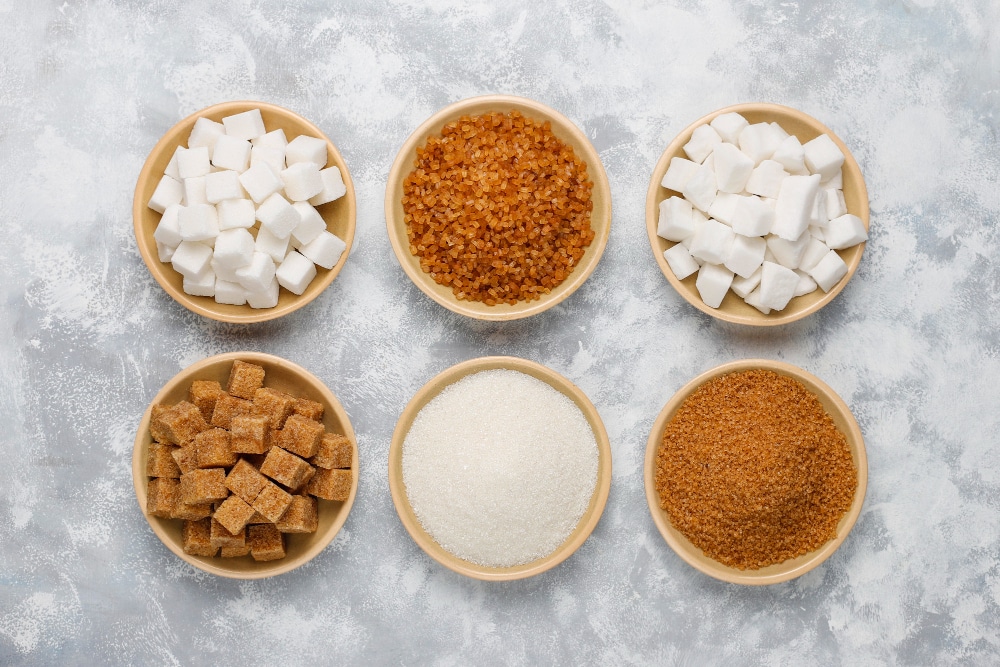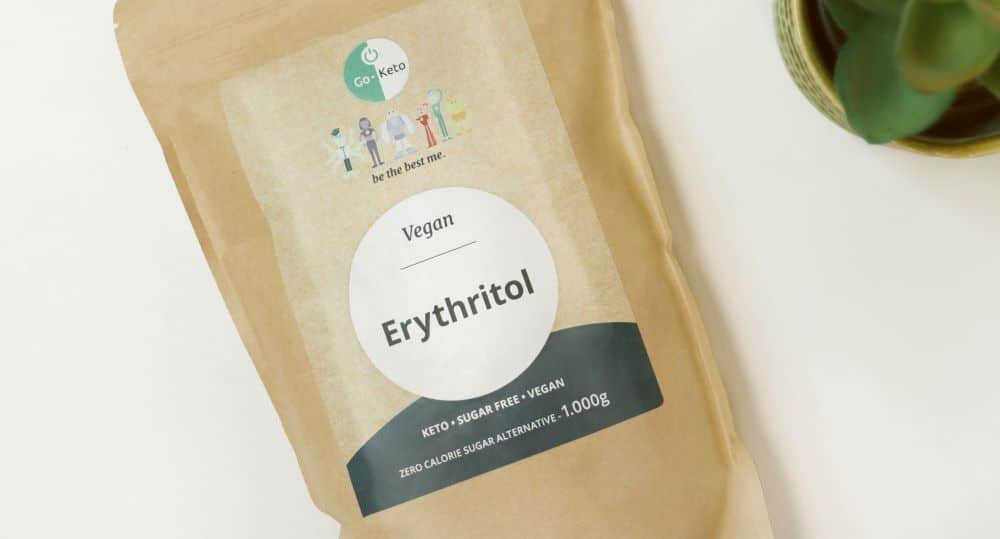In this Article:
- Carbs and sugar: the basics
- What sweeteners are there
- How to recognize sweeteners
- The 4 best sweeteners for keto
- Sweeteners to avoid
Carbs and sugar: the basics
On the keto diet, your body switches from burning sugar from carbohydrates to using ketones from fat for fuel. You enter ketosis and you burn fat 24/7. Fat burning increases drastically when the insulin levels in your blood remain as stable as possible at a low level. This makes it easier for your body to access and use the fat stores.
Of course, that’s precisely what you want when you’re trying to lose weight. And there are other benefits that are less obvious as well:
- You experience less hunger because your body uses the fat stores.
- No more blood sugar peaks and dips that so often follow carb-rich meals.
- The steady supply of energy can also make you feel more alert and focused.

Sweeteners can be great to add taste to your food without the negative impact that sugar has. But you may still want to get used to less sweetness in your food. Usually, after 1 or 2 weeks, you are used to less sugar and sweet tasting food, and you will notice that you “need” it less. In this way, you actually enjoy the pure taste that nature already gave to the dishes you prepare.
How to get in ketosis (and stay in)
The quickest way to get into ketosis is by fasting, but of course you can’t keep this up for very long. On the keto diet, you get into ketosis and maintain it by eating as few carbohydrates as possible. You need to avoid carbohydrate-rich foods such as pasta, rice, processed snacks, sugary fruits, sugar, sweets, and candy.
So, sugar’s out! But it doesn’t mean that you have to give up everything that tastes sweet when you’re on keto. There are several keto-friendly sweeteners that will give you all the sweetness you want without raising your blood sugar levels. But you need to know what they are, so you can check product labels and avoid the products that will affect your blood sugar or are unhealthy for other reasons.
Net carbs: the carbs that count
When you read about keto, ‘Net carbs’ is a term that you’ll come across regularly. Net Carbs means only those carbs that affect your blood sugar.
Net Carbs = total carbohydrates -/- zero Glycaemic Index carbs (e.g. polyols like Erythritol and Glycerol).
In this article and elsewhere on the Go-Keto website, we use ‘Go-Keto carbs’ to indicate the number of carbs in a product that you should count towards your daily carb intake. These net carbs or Go-Keto carbs are the carbohydrates that raise your blood sugar level. Polyols/fibres that do not affect your glucose levels are not included in the Go-Keto carbs.
Glycaemic Index (GI)
Besides its carb load, it pays to look at a product’s Glycaemic Index (GI). The GI tells you how fast the carbs from a product are digested and metabolized into glucose. The lower the GI of a product, the slower your blood glucose will rise. So, on keto, low carb food as well as sweeteners with a low GI are ideal for maintaining ketosis.
The GI is represented by a number between 0 and 100. The higher the number, the faster your glucose levels go up. Pure glucose has a GI of 100; table sugar has a GI of 60. A product or sweetener with a GI of zero has zero net carbs or zero Go-Keto carbs.
What sweeteners are there?
There are 2 types of sweeteners: natural sweeteners and artificial sweeteners.
- Natural sweeteners are, as the name indicates, from natural sources. We all know the high-carb/high calorie ones: sugar, syrups and honey. The low carb, low calory natural alternatives are mainly polyols with little or no net carbs and zero GI.
The best natural sweeteners are based on either stevia or polyols – we’ll tell you all about them later in this article. Stevia has a bitter aftertaste that not everyone likes. The different polyols are the better choice, each with their pros and cons. We believe Erythritol is your best choice. - Artificial sweeteners are chemical substances made in a factory or laboratory. They usually contain fewer calories and carbohydrates than regular sugar and are therefore often used in ‘diet’ and ‘light’ products such as sodas. But be careful with such products, especially if they have a very sweet taste. Even if it says ‘low-carb’, ‘carbohydrate free’ or ‘sugar free’ on the label, net carbs can still be (too) high. Their GI is often unclear and besides, there are serious concerns about the long-term health effects.
These are the most used artificial sweeteners:
- Alitame
- Aspartame
- Cyclamate
- Neotame
- Saccharin
- Sucralose
What are Polyols?
Polyols or sugar alcohols (‘alcohol’ only refers to the chemical structure; they won’t make you drunk!) are very similar in taste to sugar. They don’t have an unpleasant aftertaste like many other sweeteners. You can recognize polyols by the name: it usually ends in –ol (such as Xylitol and Erythritol).
Polyols are found in natural products. They are technically labelled as carbohydrates, but they are in fact fibres, which your body can digest poorly. The majority of the calories are not absorbed. Please note, though, that not all polyols are automatically healthy and/or suitable for the keto diet. Plus, some polyols (like sorbitol and maltitol) may cause intestinal discomfort such as gas and bloating, if you’re sensitive to this kind of fibre.
Natural Sweeteners – Go-Keto Top 3
Top 3 Natural Keto Sweeteners
If you believe that sweeteners will help you maintain your ketogenic diet, these are the 3 best options:
- Erythritol
- Stevia
- Xylitol
First Choice: Erythritol
Of all sweeteners, erythritol is closest to sugar in taste, but it has zero calories and zero impact on blood sugar and insulin secretion. Erythritol is a polyol that occurs naturally in small amounts in mushrooms and fruit such as grapes and melons. It is produced from fermented corn or maize starch and has about 70% of sweetness of regular sugar.
Erythritol is only partially absorbed and digested by the intestinal tract and is generally labelled as safe by the European Food Safety Authority (AFSA) Dutch Food and Consumer Product Safety Authority. There are several benefits to Erythritol that make it your top choice as a sweetener in your keto diet.
Pros of Erythritol
- It contains zero calories and zero keto carbs
- It does not raise blood sugar or insulin levels
- The active substance is excreted in the urine without being used by the body
- In granulated or powder form, it behaves just like sugar and is an easy replacement for it in all kinds of recipes
- It can be used both hot and cold: it won’t lose its sweetness when heated
- It’s much better for your teeth than most other sugars and sweeteners (which may cause plaque and cavities)
- The taste is like sugar. The only difference is that is gives a cooling sensation on the tongue which many people find quite pleasant
- Of all polyols, Erythritol is the least likely to cause bloating, gas or diarrhoea (although sensitivity still may occur)
Cons of Erythritol:
- Erythritol is about 30% less sweet than sugar, so you need to add a bit more for the same sweetness in your recipes. If you need the same sweetness as sugar, then try our Erythritol & Stevia blend – perfect, with no aftertaste.
Go-Keto offers various Erythritol products:
- Go-Keto Erythritol
- Go-Keto Bio Erythritol
- Go-Keto Erythritol & Stevia
- Go-Keto Erythritol Shaker
2. Stevia
In its most natural form, Stevia is a sweetener extracted from the leaves of the plant Stevia Rebaudiana. When we talk about Stevia, we refer to the concentrated steviol glycosides from the plant. This is a collective name for a number of substances, including stevioside, steviol bioside, steviol and rebaudioside.
Stevia is considered a sweetener with no nutritional value, so it contains no calories or carbohydrates. With zero net carbs, stevia does not spike blood sugar levels.
Stevia is available as a liquid and in powder or tablet form and it’s suitable for sweetening everything from desserts to drinks. However, it is 250-300 times more sweet than normal sugar. This means you need a lot less of it in your recipe to get a similar taste.
Benefits of Stevia:
- It contains no calories and no carbohydrates
- Does not increase blood sugar or insulin levels
- Safe and natural, no known side effects
- Very sweet, so you only need a little bit of it
Cons:
- Although it is intensely sweet, it doesn’t taste exactly like sugar
- Many people don’t like the Stevia aftertaste
- More difficult to cook with because you cannot exchange the amount of sugar in a recipe for the same amount of Stevia
Go-Keto Erythritol & Stevia
Go-Keto’s Erythritol & Stevia is the perfect keto sweetener. It offers you the best of both worlds! We started with Erythritol and made it a bit sweeter by adding just a little Stevia. The





